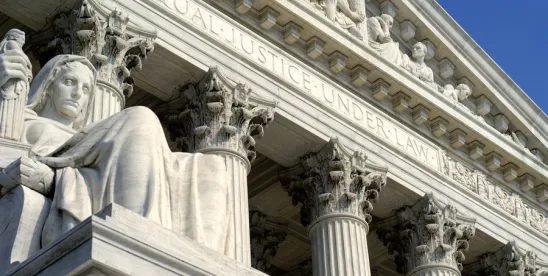The Court was back in action this week, with perhaps its most active week of the term so far. On Tuesday, the Court issued three decisions, adding two more on Wednesday and a number of cert grants for next term, to boot. Besides the uptick in volume, the decisions are also becoming a bit more contentious: This week saw several concurrences, dissents, and only our second 5-4 split of the term. It’s too much to summarize with one update, so today we’ll bring you summaries of three decisions and the cert grants, with the balance to follow after the weekend. (After all, you’ve got an Independent Counsel Report to maybe, possibly read some portion of...)
Our first case for today, Frank v. Gaos (No. 17-961), is a bit of a letdown. Three plaintiffs brought a putative class action on behalf of basically every American who uses the internet against Google, alleging that it violated the Stored Communications Act, 18 U.S.C. § 2701, by transmitting Google searchers’ search terms to webpages whenever a user visited a page following a successful search. Google moved to dismiss for lack of standing two times and lost. It tried a third time, but then decided to withdraw the motion in favor of a class-wide settlement. Google agreed to make some boilerplate disclosures about its practices, and it agreed to pay $8.5 million. But because the class consisted of nearly everyone, it was plainly not feasible to send each American their paltry share of this payment. (The cost of the stamp would likely exceed each person’s settlement check.) So instead, the agreement used a cy pres settlement, meaning that about three-fourths of the money would go to recipients, selected by the plaintiffs’ lawyers and Google, who would use the money to “promote public awareness and education, and/or to support research, development, and initiatives, related to protecting privacy on the internet.” The rest of the money, more than $2 million, would go to the plaintiffs and their lawyers.
The district court preliminarily approved this settlement as fair and reasonable under Federal Rule of Civil Procedure 23(e), as it is required to do for all class-action settlements. But Ted Frank of the Center for Class Action Fairness, an advocacy group that objects to class-action settlements it thinks are unfair and abusive, did what he does best: He objected to the settlement as unfair and abusive. The district court nonetheless gave the settlement final approval. Frank appealed, but a divided Ninth Circuit affirmed. The case was thus poised to address the propriety of cy pres settlements like these, one of the hot topics in class-action law as late. Many, like Frank, see this kind of settlement as a give-away to plaintiffs’ lawyers, one that provides almost no benefit to the class and merely serves as cover to award plaintiffs’ lawyers significant attorneys’ fees. Others see it as one of the only practical ways to settle claims involving large classes with minimal individual damages, where distributing any damage award to class members is administratively impossible.
These questions will have to wait another day. After reading the briefs, particularly that of the Solicitor General as amicus curiae supporting neither party, the Court decided that Google might have been right about standing after all. Or, more accurately, subsequent authority—the Supreme Court’s recent decision in Spokeo v. Robbins (2016)—raised a substantial question about the plaintiffs’ standing to sue at all. These questions had never been addressed, because Google’s last motion to dismiss was withdrawn before Spokeowas decided. So in a short per curiam decision, the Court remanded to the lower courts to work out whether the plaintiffs have standing. Cy pres lives another day.
If and when cy pres returns to the Court, it’ll have Justice Thomas to reckon with. He penned a solo dissent explaining that he would have reached the merits and reversed. “Whatever role cy pres may permissibly play in disposing of unclaimed or distributableclass funds,” Thomas argued, “cy pres payments are not a form of relief to the absent class members and should not be treated as such (including when calculating attorneys’ fees). Here, “because the class members . . . received no settlement fund, no meaningful injunctive relief, and no other benefit whatsoever in exchange for the settlement of their claims,” Thomas would have held that it was error to certify the class and approve the settlement.
Next up is something you don’t see every day in the Supreme Court. If you remember only one thing from your Federal Courts class in law school, it’s probably that after Erie Railroad Co. v. Tompkins (1938), there’s no such thing as federal common law. But if you remember two or three things from Federal Courts, you might also recall that there still isfederal common law, but only in certain limited areas. One of those areas is maritime tort cases, where the U.S. Supreme Court acts as an ordinary common-law court, doing ordinary common-law court things like make rules about when the manufacturers of products have a duty to warn consumers about the products’ potential dangers. In Air & Liquid Systems Corp. v. Devries (No. 17-1101), the Court did just this. And perhaps because of the novelty of this common-law task, the Court’s decision broke down on unusual grounds, with the Chief and the Court’s four more-liberal justices joining an opinion by Justice Kavanaugh, establishing a somewhat broader rule for manufacturers’ duty to warn than that favored by the three conservative dissenters of Justices Gorsuch, Thomas, and Alito.
Air & Liquid Systems made certain equipment for U.S. Navy ships. The equipment—pumps, blowers, and turbines—required asbestos insulation or asbestos parts to function. But Air & Liquid did not supply asbestos with its products; instead, it delivered the equipment “bare-metal,” and the Navy later added the asbestos. Decades later, two Navy servicemen developed cancer and sued. By that point, the plaintiffs had limited recourse: the asbestos manufacturers were bankrupt, and the Navy was likely immune. So they focused their energies on Air & Liquid, alleging that it negligently failed to warn them of the dangers of asbestos in their integrated products. In response, the manufacturers argued that they could not be held liable for harms caused by “later-added third-party parts.” The district court agreed. The Third Circuit did not.
Enter SCOTUS. Like the Goldilocks of maritime tort law, Justice Kavanaugh tried on three options for size. Option A: Impose liability whenever it was “foreseeable” that a product could be used with another, dangerous, product or part. Nope, too hard (on the manufacturers—mere foreseeability would impose sweeping burdens and uncertain duties). Option B: Draw a strong line in the sand. If a manufacturer did not make, sell, or distribute the part, it is not liable, period. But no, this one was too soft (on a company that had to know an integrated product would be dangerous). Onward, then, to Option C: “[A] manufacturer does have a duty to warn when its product requires incorporation of a part and the manufacturer knows or has reason to know that the integrated product is likely to be dangerous for its intended uses.” Just right. After all, the product manufacturer is well-placed to know the nature of the ultimate product and its associated risks. At the same time, the added burden on this manufacturer is light, as a manufacturer has a duty to warn regarding its own product already, and this rule would impose an additional duty to warn only when the product requires a dangerous part “in order to function as intended.” Finally, Justice Kavanaugh noted this rule was especially appropriate in the maritime tort context, where the law has always recognized a “special solicitude” for the welfare of sailors, particularly veterans and their families. (The servicemen themselves had unfortunately died during the course of the litigation.) Accordingly, it made sense to hold manufacturers to a slightly higher standard than might be applicable in other contexts.
The dissenters, led by Justice Gorsuch, felt the majority was out to sea. Irked by the prospect of a duty to warn imposed decades after the fact—when all that was left for Air & Liquid to do was pay—Justice Gorsuch opined that “[p]eople should be able to find the law in the books; they should not find the law coming upon them out of nowhere.” The rule crafted by the majority, he suggested, has no meaningful roots in common law, which dictates that a manufacturer has no duty to warn about a third party’s products. Better to hew to this approach, which is simple, accords with consumer expectations, and runs a lesser risk of overwhelming people with confusing fine print.
Our last opinion for today’s issue is Washington State Department of Licensing v. Cougar Den, Inc. (No. 16-1498), a case that is a bit more complicated, though no less interesting, than the others. It concerns the rights of the Yakama Nation of Indians under an 1855 treaty with the U.S. government, in which the government purchased 10 million acres of land from the Nation (roughly one-fourth the present State of Washington) for a mere $200,000. But the treaty reserved for the Yakamas certain rights, including the right “in common with citizens of the United States, to travel upon the public highways.” The Washington Supreme Court held that this provision barred the state taxing authorities from imposing certain gas import taxes on a corporate entity created by the Nation to transport gas to its reservation for sale in retail stations. A 5-4 majority agreed, with a different conservative justice this time, Justice Gorsuch, joining the Court’s four liberals. But the majority split as to the rationale. And the Court’s four other justices penned (though not all joined) two separate dissents.
The easiest place to begin is with the three-justice “majority” opinion by Justice Breyer, joined by Justices Sotomayor and Kagan. This opinion closely followed the Washington Supreme Court’s analysis, resting on two points. First, the Treaty: On a straightforward reading, the right “in common with citizens of the United States, to travel upon the public highways” seems narrow, suggesting perhaps only that the government cannot ban members of the Yakama nation from public highways. (Just how Justice Kavanaugh read it in dissent.) But precedent has long interpreted this treaty provision quite a bit differently, in part because of the special way the Court interprets treaties with Indian tribes. These treaties must be interpreted according to how the tribe would have understood the treaty at the time. After all, the treaties with tribes were often imposed on the tribes by force and written in a language the tribes could not even understand. In 1855, the Yakama Nation was a famously commercial tribe, with trading networks stretching widely throughout the West. Since 1905, the Supreme Court has therefore interpreted this particular language as intended to preserve the Yakamas’ right to travel more broadly, including their right to transport goods to and from the reservation for commercial purposes. Under this interpretation, the Treaty essentially prohibits the United States or the states from imposing burdens on members of the Tribe’s travel by public highway for commercial purposes.
Next, the details of the Washington tax: The Washington Supreme Court interpreted the import tax at issue not like a typical gas tax, which falls upon the fuel. Instead, the strange way the tax statute was written (we’ll spare you the details) meant that Washington taxed the act of importing fuel into the state, but only when such transportation was by means of road or rail. (Importation by other means, like pipeline or ship, was handled differently, and in some sense exempt.) Under this statute, the Washington taxing authorities had tried to tax Cougar Den, a special corporation established under the laws of the Yakama Nation and owned by the Tribe, that purchased gasoline in Oregon and trucked it via public highway through Washington for sale on the Yakama reservation. Imposing a tax on Cougar Den for these activities was just what the 1855 Treaty prohibited: It was burdening members of the Tribe’s ability to transport commercial goods to the reservation by public highway. But the majority was careful about how far this would go: Its decision contained lots of caveats and distinctions that make it unclear how its rationale might apply to other taxes or regulations or different factual contexts.
Justice Gorsuch, joined by Justice Ginsburg, concurred in the result, but with a different, perhaps broader, rationale. In his view, the Yakamas understood the Treaty to protect an even stronger right. Based on some previous cases, the Washington trial court had found that the Yakamas understood the treaty as not simply prohibiting the government from burdening the act of transporting goods by public highway; it prohibited any licensing or permitting fees related to the transportation of goods for the Tribe to and from the reservation. Given the history of the Yakama Nation’s way of life, Justice Gorsuch found these factual findings well supported. But, more importantly, the state had not challenged them on appeal, so it was bound by them now. These factual findings made close scrutiny of the details of the Washington tax statute largely irrelevant, because no matter how one works out the nuts-and-bolts of the statute, it was plainly imposing licensing or permitting fees on members of the Tribe for transporting goods to the reservation by public highway. That said, Justice Gorsuch also included a number of caveats, making it less than clear how even this broader reading of the Treaty will apply to other factual contexts (a reading that might not even apply for the additional reason that the state might challenge these factual conclusions the next time around).
This leads to two dissents, each addressed to a separate leg of Justice Breyer’s (and the Washington Supreme Court’s) two-leg stool. First, Chief Justice Roberts, joined by the three other dissenters, disagreed with the majority’s reading of the Washington tax statute. In his view, this was nothing more than a run-of-the-mill gas tax, one charged on the fuel Cougar Den is trucking to the reservation, not the manner in which it does so. This reading is not without some merit on a plain reading of the law, but it was not as though Justice Breyer was the first to come up with this arguably strained reading: He was just agreeing with the interpretation reached by Washington’s own Supreme Court, which ordinarily would be entitled to some deference when it comes to interpreting the state’s own laws. Perhaps this interpretation was simply too strained for deference. (The Chief Justice doesn’t say much about this point, so we can’t really know. But he might not be alone—perhaps the explanation for the concurrence is that they too were uncomfortable with the Washington Supreme Court’s odd reading of its own statute.) Thus, without expressly disagreeing with the majority’s interpretation of the scope of the Treaty, the Chief Justice concluded this tax fell outside the Yakamas’ reserved rights, because a tax on a good being transported is not the same as a tax on the act of transportation.
Justice Kavanaugh, joined only by Justice Thomas, took a stronger line. In his view, the Treaty’s preservation of the right to use the public highways “in common with citizens of the United States” established nothing more than a right to be free from discrimination; it did not preserve some broader right to travel free of generally applicable burdens like taxes. These Justices seemed to be adopting (without quite arguing for) a plain-reading approach to treaty interpretation, an approach that is hard to square with how the Supreme Court has generally interpreted treaties with Indian tribes, including in cases involving this very treaty.
Finally, the Court added four new cases to its docket for OT19:
-
In Kansas v. Garcia (No. 17-834), the Court will decide “(1) Whether the Immigration Reform and Control Act expressly pre-empts the states from using any information entered on or appended to a federal Form I-9, including common information such as name, date of birth, and social security number, in a prosecution of any person (citizen or alien) when that same, commonly used information also appears in non-IRCA documents, such as state tax forms, leases, and credit applications; and (2) if IRCA bars the states from using all such information for any purpose, whether Congress has the constitutional power to so broadly pre-empt the states from exercising their traditional police powers to prosecute state law crimes.”
-
In Mathena v. Malvo (No. 18-217), the Court will decide whether the Fourth Circuit erred in concluding that the Court’s decision in Montgomery v. Louisiana (2016), which concluded that its previous decision in Miller v. Alabama (2012) announced rule of constitutional law that must be given retroactive effect, also modified and substantively expanded the rule announced in Miller.
-
In Ramos v. Louisiana (No. 18-5924), the Court will decide whether the Fourteenth Amendment fully incorporates the Sixth Amendment guarantee of a unanimous verdict.
-
And in Kahler v. Kansas (No. 18-6135), the Court will decide whether the Eighth and Fourteenth Amendments permit a state to abolish the insanity defense





 />i
/>i

